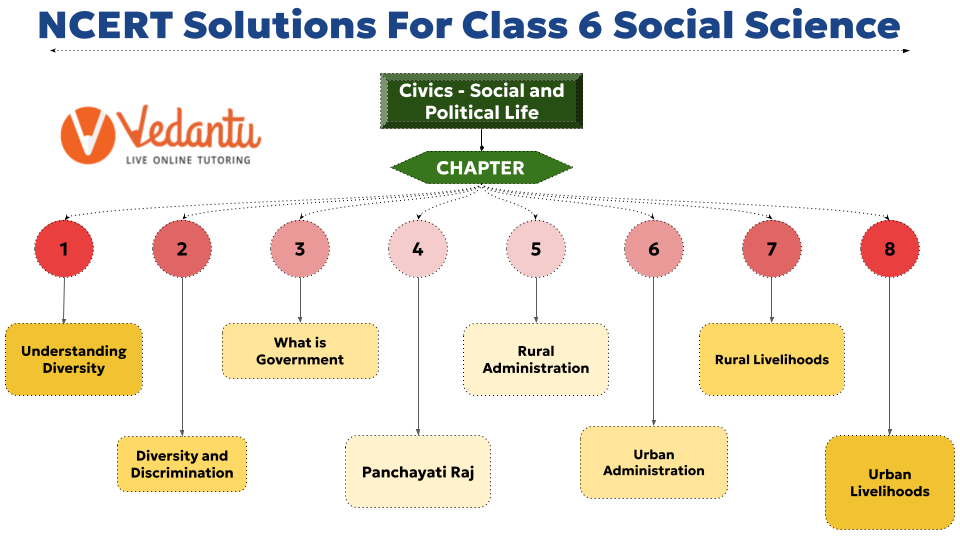Chapter-wise Class 6 Social Science Social And Political Life Questions and Answers Free PDF Download
FAQs on NCERT Solutions For Class 6 Social Science Social And Political Life All Chapters - 2025-26
1. Are the NCERT Class 6 Civics Solutions a reliable source for exam preparation?
Yes, it is the NCERT Class 6 Civics Solutions is made by professionals and expert faculty teachers with years of experience. All solutions are provided with a thorough description and classification of all topics and sub-topics, which will support the students in clearing most of their difficulties. It also includes follow-through and in-depth study of each question, which supports the students to learn the gist of the question and prepares them to address a single question in 2-3 different ways. The solutions are created after a precise analysis of the prevailing syllabus, in a way that it can adjust to the understanding of the students.
2. Which chapter of Civics Class 6 NCERT requires more attention?
There are nearly 9 chapters in total for Civics Class 6 NCERT. Students must understand the key topics present in all these chapters and work on solving questions regularly as every chapter is equally necessary to score high marks in the annual exam. Significant dates, laws, amendments, and policies are marked in every chapter so that students can learn and follow them easily while writing answers in the exam. The Vedantu provides a Civics Class 6 NCERT in PDF format. You can take live sessions from expert teachers as well. Visit the website now to download NCERT solutions for class 6 political science.
3. How can I effectively use the Civics Class 6 NCERT Book?
Understanding Diversity, What is Government, Panchayati Raj, and other topics are covered in the NCERT Class 6 Social Science Social and Political Life book. Students in Class 6 Social Science should study their Social and Political Life textbook thoroughly in preparation for the final test to achieve the desired results. Students will be able to write exact and extensive answers to the textbook questions if they grasp the principles presented in the textbook PDF.
4. What is social and political life according to NCERT Class 6 Political Science?
Social and political life is often referred to as civics, but civics is not the proper term to address the chapters covered in the NCERT textbook of social and political life. Civics is an outdated term for political science. Hence, we must, at all times, refer to it as social and political life and not call it civics. Students should refer to the NCERT Class 6 Political Science on the Vedantu website for the answers to all the questions in the textbook. These solutions PDF can be downloaded free of cost.
5. What is government according to NCERT Class 6 Political Science?
The main aim of government establishment in India and the need for government are discussed in NCERT Class 6 Political Science. It also discusses the many types of governance. A government is a system or collection of individuals who have the authority to rule a country or state. The government is primarily responsible for setting government policies for the entire society. A government can be a democracy, a republic, a monarchy, an aristocracy, or a dictatorship, among other things.
6. What do you learn from the NCERT Solution Class 6 Civics?
In Class 6 Social Science Social Science-Social and Political Life, students will learn the basics of political science. As political science is introduced to the students of Class 6 Social Science for the first time, you must make sure that you read the NCERT textbook of Social and Political Life Class 6 Social Science very thoroughly. You should also ensure that all the topics, definitions, concepts, and procedures are covered by you as they are very important from an exam point of view.
7. How does studying about diversity in India help in understanding democracy in NCERT Solution Class 6 Civics?
Studying diversity in India helps in understanding democracy by showcasing how a democratic system accommodates various cultures, religions, and languages. It emphasizes the importance of tolerance, inclusivity, and respect for differing viewpoints, which are fundamental to democratic principles.
8. What are the roles and responsibilities of citizens in a democratic society, as discussed in NCERT Solution Class 6 Civics?
In a democratic society as discussed in Class 6 Civics, citizens have roles such as participating in elections, respecting the rights of others, obeying laws, paying taxes, and actively engaging in community issues. These responsibilities ensure the functioning of a fair and just society where everyone's rights are protected.
9. How does understanding the functioning of the Parliament and State Legislatures contribute to our knowledge of governance in India?
In NCERT Solution Class 6 Civics understanding the functioning of Parliament and State Legislatures contributes to our knowledge of governance in India by revealing how laws are made, debated, and implemented. It highlights the checks and balances in the legislative process, ensuring accountability and representation of citizens' interests in governance.
10. Why is it essential to study about environmental conservation and sustainable development in NCERT Solution Class 6 Civics?
Studying environmental conservation and sustainable development in Class 6 Civics is essential because it teaches students about the responsible use of natural resources, environmental protection, and the impact of human activities on ecosystems. It fosters awareness about sustainable practices that promote long-term ecological balance and the well-being of future generations in a democratic society.
























